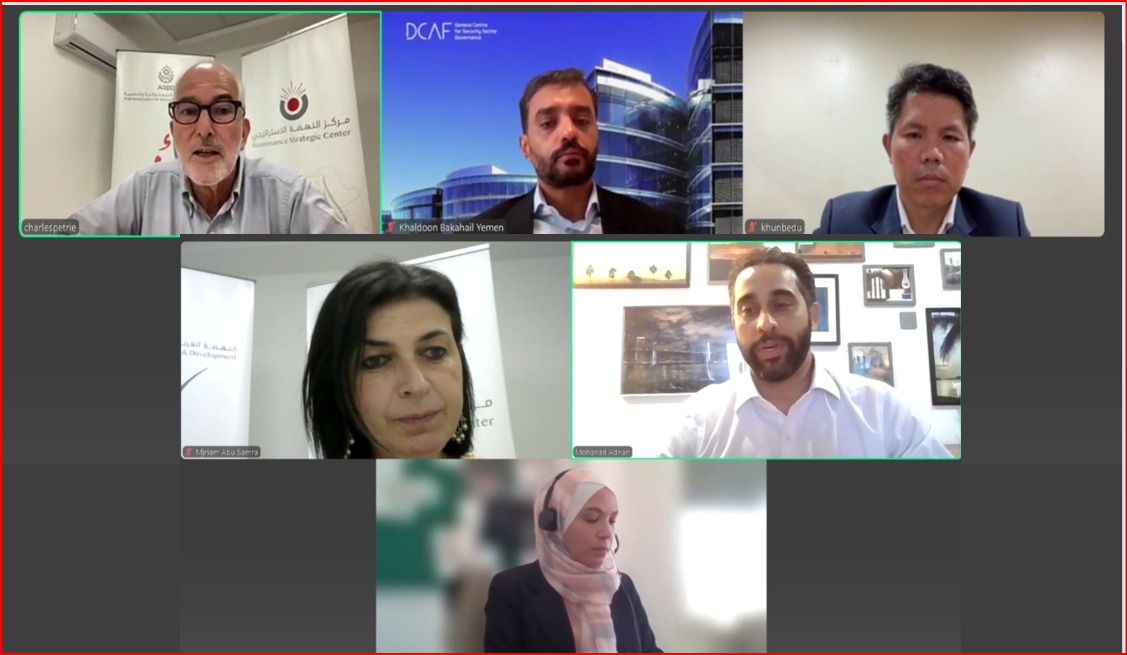The Renaissance Strategic Center (RSC), as part of the Arab Renaissance for Democracy and Development (ARDD), facilitated an engaging virtual discussion titled “Reimagining Participatory Governance in the Arab Region: Local Practices and Comparative Lessons from Karenni State.” The webinar aimed at advancing a new understanding of governance in the complex, challenging context of the Arab world, where prolonged conflicts, fragile institutions, and declining public trust have highlighted the limits of top-down approaches to civic engagement. In response, localized and participatory approaches—emphasizing civic trust, inclusion of youth and women, and proximity networks linking state and society—are increasingly viewed as essential to rebuilding legitimacy and resilience across the region. Against this backdrop, the case of Karenni State in Myanmar offered a powerful comparative lens: its locally driven governance structures, emerging amid conflict and institutional collapse, provide valuable lessons on decentralization, accountability, and community-based legitimacy that resonate with Arab contexts of fragmentation and transition. The RSC convened four esteemed panelists to reflect on these themes across two sessions, connecting regional governance debates with global comparative insights.The RSC brought four esteemed panelists together to discuss local governance frameworks within their country specialty across two sessions. The speakers for Session I, titled “Governance from Below in Conflict-Affected Settings – the Karenni State Experience,” included Khun Bedu, Vice-Chairperson of the Karenni State Interim Executive Council, and Khaldoon Bakahail, Senior Strategic Advisory at the Geneva Center for Security Sector Governance (DCAF) and former Yemeni Deputy Minister for Internal Administration. The speakers for Session II, titled “Conceptualizing Governance in the Arab Region – Challenges, Alternatives, and Emerging Models,” included Mohanad Adnan, Executive Director of Roya Development Group Iraq, and Deema Abu Thiab, Head of Country Programme: UN Habitat Jordan.
Session I: Facilitated by Charles Petrie, ARDD Senior Advisor and former UN Assistant Secretary General, commenced the webinar by establishing its key themes. A starting premise is that when strong, central, many times oppressive, regimes collapse, the spaces vacated allow local governance structures to emerge. Attempting to try to reestablish a central authority – very much a Westphalian approach to governance – becomes almost impossible in the short to medium term. The examples of Somalia, Central African Republic, Libya, Yemen and Myanmar being among the demonstrations of this reality. There is thus a need to acknowledge the existence of these local governance structures and understand the contribution they can make in re-establishing a functioning State.
Khun Bedu presented his unique experience in Karenni and their bottom-up federalism framework which prioritizes institution building, decentralizing power to local administrations, and improving local trust through transparency and accountability of the administrative structures. Khaldoon Bakahail expanded and applied these notions to the context of Yemen, explaining how fragmentation, and the essence of conflict itself, has laid the groundwork for local stabilization initiatives, and advocacy toward a more representative and federalist structure. The session then opened the floor for audience participation. Issues that were raised included climate change, food insecurity, and the role of external assistance. To the query of the role of external assistance, Bedu outlined Karenni’s attempt to establish a regional multi-donor trust fund. Bakahail strongly advocated for the international community to not intervene in Yemeni’s political power-sharing negotiations. Instead, the focus should be turned towards reviving the federal framework that had been agreed to in the past and that could ensure some levels of stability. Bakahail went on to say that the question of climate change and food insecurity must be addressed with a holistic approach, involving civil society, youth, and women. Local mitigation strategies should be tailored to provide opportunities for climate action.
Session II: Facilitated by Mariam Abu Samra, Coordinator at the RSC, expanded the concepts explored in the first session and focused on the governance experiences characterizing differing contexts across the Arab region. Of primary importance was engagement from the ground-up, with emphasis on the participation of youth, the disabled, and women in identifying opportunities. Mohanad Adnan articulated how Iraq, as a country that experienced decades of conflict, has witnessed a power struggle between its federal parliament and its local and provincial councils. The fear that the provincial councils were siphoning too much power from the federal parliament – a conflict of authority – led to the dissolution of provincial councils. Adnan emphasized the role protests played in getting the youth greater recognition from the government, something that women and the disabled have yet to achieve. Deema Abu Thiab brought the discussion to the local Jordanian context, where UN Habitat works to engage citizens in shaping policies that will allow for a better urban future. In connection with Adnan, Abu Thiab explained how creative initiatives, such as the Jabal Amman Neighbourhood Planning project with ARDD, aim to encourage youth participation and the promotion of community-driven planning. When opened to the wider discussion with viewers, Abu Thiab and Adnan both expressed the immediate need for climate action initiatives pertaining to flash flood prevention in Jordan and water treatment mechanisms in Iraq.
This discussion brought experienced individuals from a range of contexts together to explore the significance and potential of local governance in addressing the challenges of the Arab region and the world as a whole. Such questions as youth and female participation, as well as the threat of climate change were raised. Contrary to conventional perception, it was argued that conflict can form the necessary foundation for the emergence of viable local governance structures. Accepting this reality and building strategies incorporating local governance can contribute to future stability in the face of a constantly changing world.



